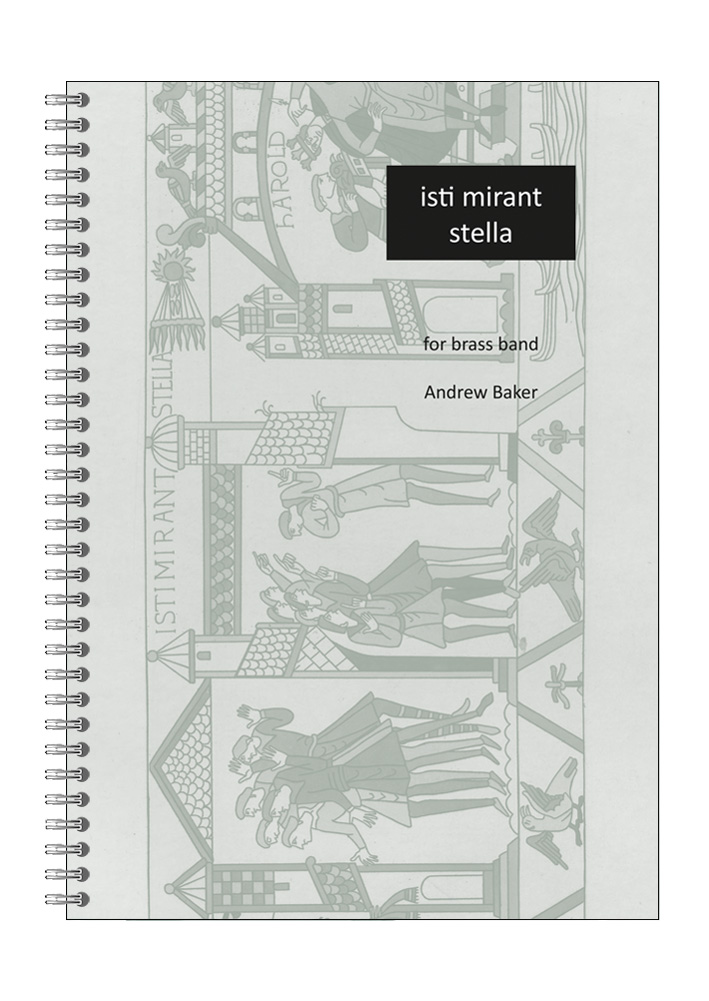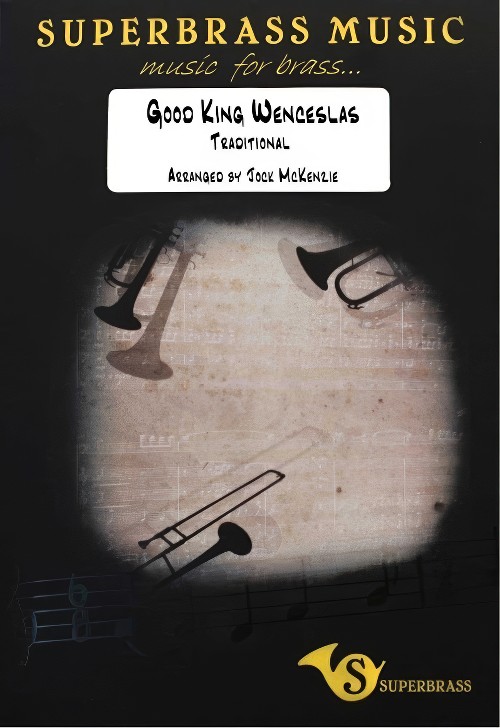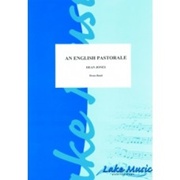Results
-
 £45.00
£45.00isti mirant stella
Descriptionisti mirant stellais based on an extract from the text of the Bayeux Tapestry, which was commissioned by Odo, Bishop of Bayeux, to commemorate the Norman conquest of England in the 11th century. This text relates to the appearance of Halley's Comet in the spring of 1066. King Edward the Confessor died without an heir early on 5 January 1066 and despite his apparent promise of the throne to William, Duke of Normandy, the Anglo-Saxon Witenagemot appointed Harold Godwinson of Wessex as his successor. Just after Harold's hastily arranged coronation the comet appeared, reaching its perihelion on 20 March 1066. In the Middle Ages comets were regarded as evil omens; the tapestry depicts men gazing at the "star" in wonder and Harold himself apparently lost in nightmarish visions of invasion, with ghostly ships in the margins of the tapestry.The music attempts to reflect the mood of this brief but crucial period of English history - the unsettled matter of the royal succession linked in the superstitious medieval imagination to the haunting, spectral apparition of the comet. Medieval composition techniques are employed in places, including the use of a 'tenor', hocketing and a brief isoryhthmic motet. The music attempts to avoid tonal centres and particularly any form of diatonic 'resolution', instead exploring the issue of unresolved dissonance as a musical device in its own right.Performance Notes:All cornets, flugel and solo horn will require bottles filled with water to varying levels to 'tune' them to the correct pitch for the closing section of the piece. Pitches for the bottles are notated in the same transposition as the player's main instrument, so for example a notated D in the bottle part for flugel would sound as a C.All cornets except soprano require harmon mutes; where these are marked 'TR' these should have the tube removed. 'TI' denotes the tube should be left all the way in. Soprano and solo cornet III require metal straight mutes; flugel, all tenor horns, 2nd baritone and both euphoniums require fibre straight mutes. Soprano, all solo cornets and all trombones require cup mutes.The percussion section will require vibraphone (with a suitable bow, preferably a 'cello bow), glockenspiel, tubular bells (low and high E only), concert bass drum, tam-tam and snare drum - the bass drum and tam-tam will require brushes in addition to the normal beaters. In addition 1st horn and 1st baritone are required to play triangles, which should ideally be different pitches if possible.Approximate duration 7'48"NOTE: This set comes with a B4 score. To view a PDF preview click here.
Estimated dispatch 7-14 working days
-
 £204.00
£204.00Folklore - Kjetil Djønne
"Folklore" is a work for brass band and percussion loosely based on the story of the Norwegian woman accused of witchcraft, Anne Pedersdotter. She was sentenced to be burned at the stake in Bergen in the spring of 1590 and has since been frequently highlighted as Norway's most famous and talked-about witch.The work begins with the movement "Lyderhorn," depicting the mountain outside Bergen where witches gathered to plan magical actions against the city. Here, we hear the quietness of nature and the wind blowing through the trees before a new theme appears, which will come to life in the next movement. In the distance, the witches have started their ceremony.In the next movement, "Walpurgis Night," the witches perform their rituals to afflict the city with fire, disease, and natural disasters. The ceremony becomes more and more chaotic, violent, and compelling until the darkness of the night envelops us, concluding the section.The third movement describes the women's inner struggle against the harassment they faced when the people of Bergen suspected them of being witches. Rumors often turned into formal accusations from the legal system, and many were sentenced to death after undergoing trial. "From life to death through the fire."The fourth and final movement, "The Pyre," depicts the actual death sentence. You can hear the pyre being ignited and the flames growing and intensifying. It all culminates in a chorale as a memorial to the lives that were taken.
Estimated dispatch 5-14 working days
-
 £26.95
£26.95Do You Recall? (Trombone Solo with Brass Band - Score and Parts)
A slow, bluesy solo for trombone with band accompanimentLike many people, I took the opportunity offered by the COVID lockdown in Spring of 2020 to sort through old paperwork. I discovered a lot of songs that had not seen the light of day for many years and were mostly written with just the melody and chord symbols. Some offered the potential of becoming instrumental solos with a combination of heart-on-the-sleeve melodies the like of which I would not write now, together with maybe a greater sophistication in the instrumental writing. I had the notion in the back of my mind that Do you recall?; would work as a trombone solo but it seemed to fight me all the way. However, once finished it has proved to appeal to trombonists and has already been recorded by Brett Baker. It is not intrinsically difficult but needs a sense of the appropriate slow swing style and good control throughout the range.- Rob WiffinDuration: 4.15
Estimated dispatch 7-14 working days
-
 £35.00
£35.00Good King Wenceslas (Brass Band - Score and Parts) - McKenzie, Jock
This popular Christmas carol tells the story of a Bohemian King who braved harsh winter weather to give alms to a poor peasant. This takes place on the Feast of Stephen, the first day of Christmas (December 26th). This legend is based on the life of the historical Saint Wenceslas 1, Duke of Bohemia (907 - 935). In 1853 the English hymn writer John Mason Neale wrote his own version of this tale, setting his words to the melody of a 13th century spring carol "Tempus adest floridum" which had first been published in Piae Cantiones (1582). It is this version that has endured to become the popular carol of today. Duration: 4.30
Estimated dispatch 7-14 working days
-
 £34.95
£34.95Over The Horizon - Christopher Bond
Over the Horizon (2017), whilst both harmonically and compositionally a simple endeavour, is a spine-tingling beautiful melody for soprano cornet. Based on the painting seen in the sleeve notes of Steve Stewart's album of the same name, the work takes its inspiration from the open expansiveness of the ocean, glistening in the moonlight as four people sit quietly - two parents, a boy, and a girl. A feeling of heartfelt longing throughout the work which is developed both melodically and texturally by soloist and accompaniment; perhaps reflecting the desire to know indeed what is over the horizon. The longing intensifies with a climatic section of grandeur - a feeling of longing which arguably isn't resolved until that all-important - and high - last note. Over The Horizon was written for and commissioned by Steve Stewart and Cory Band in Spring 2017.
Estimated dispatch 5-10 working days
-
 £69.99
£69.99English Dances, Set 1, Op. 27: No. 1 - Sir Malcolm Arnold
English Dances, Set I, opus 27, is a light classic composition that was written for orchestra by the British composer Malcolm Arnold in 1950. The set contains four dances that continue without pause: the individual movements are indicated by the tempo markings. The work came about at the request of Bernard de Nevers, at the time the head of publisher Alfred Lengnick & Co., who asked Arnold to write a suite of dances as an English counterpart to Dvo ak's Slavonic Dances and Bartok's Romanian Folk Dances. The premiere took place in the spring of 1951, played by the London Philharmonic Orchestra, conducted by Sir Adrian Boult. Following the success of the first set, DeNevers asked the composer to write a second one, which Arnold completed the next year (Op. 33). The Andantino from the first set has been skilfully arranged and orchestrated for brass band by Ray Farr.
Estimated dispatch 5-14 working days
-
 £90.30
£90.30Minnen fran Holmen - Jerker Johansson
The first theme was written the summer 1997 when Jerker Johansson was composing in Swedish folk music style for an intended radio programme in which his father should participate reading poems in local dialect. Unfortunately, the project was discontinued. In the spring 2015 Mr. Johansson however started to work on the theme again, this time adding a song theme of broader character. Holmen is the name of the homestead where Mr. Johansson's father Arne grew up. It is beautifully located in the parish of Skarv, situated east of Skara, one of the oldest towns in Sweden. At Holmen, the composer spent his childhood summers and his recollections are filled with many bright moments andhappy memories. The piece was premiered May 22, 2015 by the Goteborg Wind Orchestra conducted by the composer.
Estimated dispatch 5-14 working days
-
 £56.00
£56.00ENGLISH PASTORALE (Brass Band Set) - Jones, Dean
2015 National Championships Regional Testpiece - 4th Section. Score and Parts. This piece realises a long-time ambition of the composer to write a descriptive piece in a pastorale style. The idea of depicting the seasons and reflecting some of the grandeur of the English scenery proved an inspiring source to write this 4 movement piece. After the dignified initial theme Heralding the Dawn is established, the piece moves naturally into Autumn on the Plaines, a light, joyful scene. Winter in the Dales has a more mysterious and contains a somewhat darker feel in the minor key while Spring on the Lakes is a flowing, scenic movement. Summer on the Quays starts with some exciting fanfare-like qualities initially from the Cornets and Trombones, but then extra impetus is provided from the whole band. The music moves then into a dynamic and resounding conclusion. Duration: 11:40
Estimated dispatch 7-14 working days
-
£79.00
Minnen fran Holmen - Jerker Johansson
The first theme played by the solo clarinet was written by Jerker Johansson the summer 1997, when he was composing in Swedish folk music style for an intended radio programme in which his father should participate reading poems in local dialect. Unfortunately, the project was discontinued. In the spring 2015 Mr. Johansson however started to work on the theme again, this time adding a song theme of broader character. Holmen is the name of the homestead where Mr. Johansson's father Arne grew up. It is beautifully located in the parish of Skarv, situated east of Skara, one of the oldest towns in Sweden. At Holmen, the composer spent his childhood summers and his recollections are filled with many bright moments and happy memories. The piece was premiered May 22, 2015 by the Goteborg Wind Orchestra conducted by the composer.
Estimated dispatch 12-14 working days
-

 £32.99
£32.99Rhapsody For Bb Baritone, Joseph Knight
This piece for solo baritone and brass band and lasts for just over six minutes. It is in four different sections with themes returning throughout. The four sections represent the four seasons of the marsh. The inspiration came from frequent walks over these now world famous marshes (recently the quickest ever traverse of a coocoo from Africa to Europe was recorded by a bird from Carlton). It starts with spring and then moves to, an at first, angry summer, then we have the gentleness of autumn which moves into the crispness of winter. The soloist would need to be of at least grade 7 standard and it requires, however briefly, for the soloist to attain a top D.
Estimated dispatch 5-7 days
